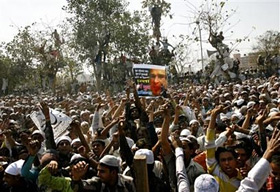 |
 |
 |
 News from Around the Americas | March 2006 News from Around the Americas | March 2006  
Bush Arrives in India to Mass Muslim Protests
 AFP AFP


| | Indian protesters stage a rally against U.S. President George W. Bush in New Delhi Wednesday, March 1, 2006. After a surprise stop in Afghanistan, Bush was scheduled to arrive in India Wednesday night to begin a tour of south Asia. (AP/David Guttenfelder) |
US President George W. Bush arrived in New Delhi, where tens of thousands of Muslims have protested his first visit to India which will include talks on a landmark deal on civilian nuclear trade.

Accompanied by his wife Laura and US Secretary of State Condoleezza Rice, Bush was met by Indian Prime Minister Manmohan Singh at the capital's Palam airport at the start of a three-day visit.

Hours before Bush flew in direct from a surprise trip to Afghanistan -- some 50,000 Muslims staged heated protests near New Delhi's main business district.

Protestors carried anti-US banners and shouted slogans such as "Bush, Bush die!" and "Bush, go back!"

"We do not want Bush here as he is the world's biggest terrorist. He has no place in the land of (Mahatma) Gandhi," said Abdul Hameed Naumani, spokesman for the Jamiat Ulama-i-Hind, the Muslim group which organised the protest.

Left-wing parties and workers' organisations were preparing for similar protests Thursday, while communist MPs said they would stage a sit-in demonstration in parliament.

In Kabul, Bush said the US relationship with India was "broader than our discussions about energy."

"Ours is a strategic relationship," he told reporters. "It is a relationship that's got strong ties because of economics and our military, our desire to help democracies such as Afghanistan."

US officials had been in contact with their Indian counterparts by telephone from the aeroplane on the way to South Asia in an attempt to stitch up the civilian nuclear deal, he said.

But Bush added: "It's a difficult issue for the Indian government; it's a difficult issue for the American government. And so we'll continue to dialogue and work, and hopefully we can reach an agreement."

"If not, we'll continue to work on it until we do. It's in our interests and the interests of the United States -- it's in the interests of countries around the world that India develop a nuclear power industry because that will help alleviate demand for fossil fuels," he said.

US Secretary of State Condoleezza Rice told reporters travelling with Bush that it was necessary to ensure India adhered to any accord it signs.

She said, "the one thing that is absolutely necessary is that any agreement would assure that once India has decided to put reactors or safeguards, that it remains permanently under safeguards."

The agreement will acknowledge India's military nuclear status and allow the energy-starved nation to accept help for its civilian nuclear program.

To seal the deal, New Delhi must separate its civil and military programs so that military facilities do not benefit from nuclear technology transfers.

On the eve of Bush's visit, Indian Prime Minister Manmohan Singh said in an interview broadcast on US television network PBS that he was still hopeful an agreement could be reached.

The deal would be "a great contribution of President Bush to ending India's isolation from the world nuclear order," he said.

An Indian official said the cabinet committee on political affairs had met Wednesday evening in Delhi and had "given its its approval to finalise the nuclear deal with the president."

India has long been denied civilian nuclear technology because it possesses nuclear weapons and has refused to sign the Nuclear Non-Proliferation Treaty.

Bush was also scheduled to meet chief executives of top US and Indian firms in New Delhi to hear about the bottlenecks impeding business ties.

After talks with Indian leaders in New Delhi on Thursday, Bush was scheduled Friday to visit the southern city of Hyderabad, known for its mix of cutting-edge industries and as a hub of agricultural and pharmaceutical research.

He was due to give his main address in the Indian capital on Friday night and leave the following morning for Islamabad.

New Delhi has placed its entire police force of 71,000 officers on high alert and sealed off the hotel where Bush and his entourage will stay during the trip, the second to India by a US president in six years. | 
 | |
 |



